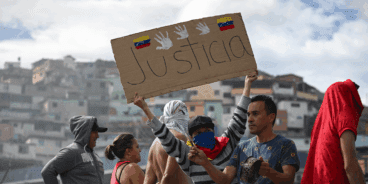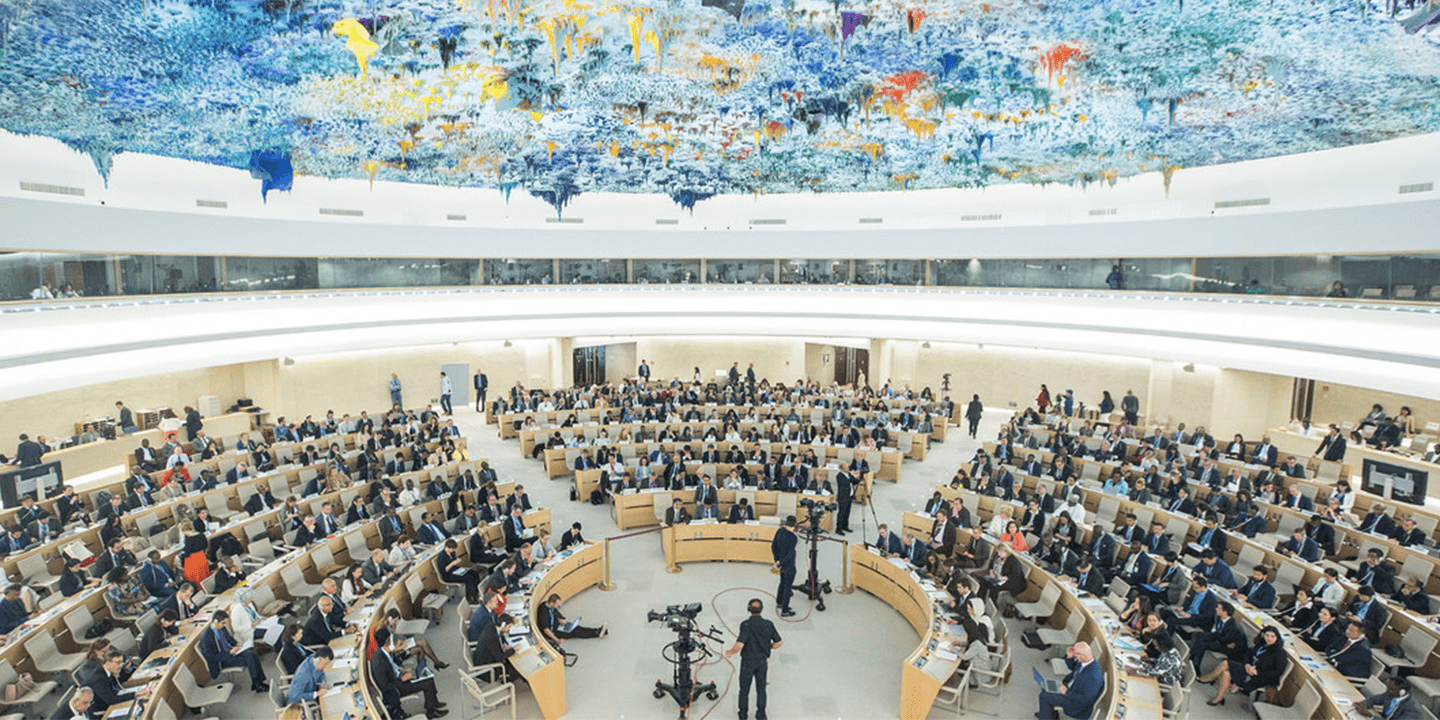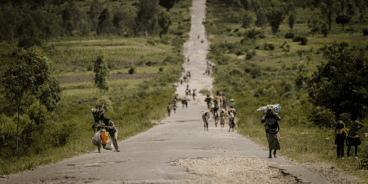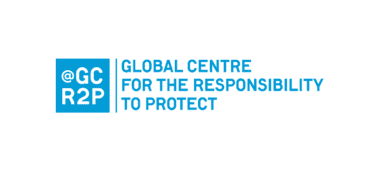

Letter to UN Human Rights Council members on atrocity prevention priorities at the Council’s 59th session
Your Excellency,
On behalf of the Global Centre for the Responsibility to Protect, I am writing to you regarding the 59th session of the UN Human Rights Council (HRC) in Geneva.
The HRC plays an essential role in the prevention of mass atrocity crimes by responding to situations where populations are at risk of, or are experiencing, genocide, war crimes, crimes against humanity or ethnic cleansing. During its 44th session in July 2020 the HRC adopted Resolution 44/14 on the Responsibility to Protect (R2P), recognizing the important contribution of the UN human rights system in addressing situations where there is a risk of atrocity crimes being committed. This is in line with the Council’s prevention mandate, enshrined in UN General Assembly Resolution 60/251, which stipulates that it shall “contribute, through dialogue and cooperation, towards the prevention of human rights violations and respond promptly to human rights emergencies.”
We strongly urge you, as a current member of the HRC, to uphold this shared commitment to prevent atrocity crimes. The Global Centre respectfully encourages you to consider the following recommendations as you engage in the 59th regular session:
Afghanistan
Since the Taliban de facto authorities assumed control of Afghanistan in August 2021, they have imposed a series of deeply repressive policies that deny women and girls their fundamental human rights. These measures constitute extreme gender-based discrimination and represent a blatant violation of the Convention on the Elimination of All Forms of Discrimination Against Women (CEDAW). To date, the Taliban have issued over 100 edicts, regulations and decrees specifically targeting women and girls, severely restricting their freedom of movement, expression, employment, political participation and access to education and healthcare.
In March 2025 the UN Special Rapporteur on the situation of human rights in Afghanistan released a study on the so-called law on the promotion of virtue and the prevention of vice, implemented in August 2024. These measures aim to erase women from public life – mandating full face coverings and prohibiting them from speaking or being heard in public. The Special Rapporteur reiterated in the report that the Taliban’s actions may amount to gender persecution and could constitute gender apartheid, as the de facto authorities appear to be governing by systemic discrimination intended to subject women and girls to total domination.
The Taliban have also carried out widespread and systematic human rights abuses. These include extrajudicial killings, arbitrary arrests and detentions, enforced disappearances and acts of torture against former government officials, security personnel, journalists and human rights defenders. Ethnic and religious minority communities, particularly Shia Hazara, other Shia Muslims, Sufis, Sikhs and others, have also been frequently targeted by the Taliban and the so-called Islamic State in Iraq and the Levant-Khorasan (ISIL-K). ISIL-K regularly claims responsibility for coordinated attacks on minority groups and places of worship. The UN Special Rapporteur reported that these attacks appear to be systematic in nature and reflect elements of an organizational policy, likely amounting to crimes against humanity.
The Global Centre respectfully urges your delegation to utilize the Enhanced Interactive Dialogue on the Special Rapporteur’s report to emphasize the urgent need for justice and accountability for likely atrocity crimes. We encourage your delegation to condemn ongoing violations of CEDAW and reaffirm the responsibility of all member states to uphold its provisions.
We also encourage you to highlight the centrality of atrocity prevention, the protection of women’s rights and the meaningful participation of women in all political processes, including the Doha Process and the comprehensive framework outlined in the UN Secretary-General’s Independent Assessment (S/2023/856), led by the UN Assistance Mission in Afghanistan. Any credible political settlement must be rooted in human rights, particularly the rights of women and girls. Women human rights defenders and civil society actors must be fully included in all negotiations with the Taliban and in shaping Afghanistan’s future.
Central African Republic
Civilians in the Central African Republic (CAR) continue be at risk of atrocity crimes due to ongoing violence by myriad armed groups and abuses by government and allied forces. The Coalition of Patriots for Change (CPC), a loose alliance of predatory armed groups with a history of perpetrating atrocities, and its dissident factions, have continued to perpetrate violent attacks, primarily harming civilians in the northwest, east and south. The Central African Armed Forces and mercenary operations have disproportionately targeted ethnic and religious minorities.
Inter-communal tensions have also heightened as some armed groups are increasingly targeting civilians along ethnic and religious lines, notably in southeast CAR. A report released on 5 March by the UN Human Rights Office and UN peacekeeping mission (MINUSCA) documents likely war crimes by armed groups, primarily targeting Muslim communities and Sudanese refugees in the southeast. The report utilizes the UN’s Framework of Analysis for Atrocity Crimes, warning that there are significant risks of recurrence, including the tolerance of hate speech on ethnic and religious grounds, a lack of state presence, unclear chain of command and a prevailing climate of impunity.
During the HRC’s 58th session, Valentine Rugwabiza, Special Representative of the Secretary-General and Head of MINUSCA, stressed that CAR is at a “crossroads” and that extending state authority – across administrative, judicial and security sectors – must be grounded in justice and respect for the human rights of all. The upcoming local elections in August and planned presidential elections later this year are a critical phase in the consolidation of peace in CAR; however, authorities have cracked down on dissenting voices, human rights defenders, political opposition and independent media. CAR has a history of election-related violence, including most recently during the presidential and parliamentary elections in December 2020, when the CPC launched an offensive against the government to disrupt the elections. This period was marked by heightened political grievances, the proliferation of hate speech and escalating violence targeting civilians.
The Global Centre respectfully urges your delegation to utilize the upcoming Interactive Dialogue with the Independent Expert to underscore the critical need for CAR authorities, in partnership with affected communities, civil society, the Independent Expert and MINUSCA, to strengthen social cohesion and peacebuilding initiatives in the southeast to prevent further atrocities and reduce tensions. Moreover, we encourage your delegation to highlight the critical importance of continued monitoring and reporting of human rights trends – using the Framework of Analysis – to help alert the international community of appropriate prevention and protection strategies, particularly in light of the resurgence of ethnic and/or religious-based violence, political tensions and propagation of hate speech, which heighten election-related atrocity risks.
Democratic Republic of the Congo
Since early 2025 populations in the eastern provinces of the Democratic Republic of the Congo (DRC) have faced widespread abuses and possible atrocity crimes as the March 23 Movement (M23), bolstered by Rwanda Defence Force support, intensified its offensive in North and South Kivu, seizing provincial capitals and consolidating control. The clashes between M23 and the government’s armed forces (FARDC), supported by a coalition of militias known as the Wazalendo, have killed at least 7,000 people and displaced over one million people, many multiple times over. Meanwhile, other armed groups continue to threaten civilians in Ituri province. Sexual and gender-based violence, used as a weapon of war, has reached unprecedented levels, with children comprising up to 45 percent of the nearly 10,000 reported cases in two months.
At the root of the protracted crisis and recurrent violence in eastern DRC is a thriving conflict economy, driven by the illicit exploitation of mineral resources. UN Deputy High Commissioner for Human Rights Nada Al- Nashif has stressed that any sustainable solution must address these underlying drivers of conflict.
In response to the deteriorating crisis, in February the HRC held a special session at the request of the DRC government and unanimously adopted a landmark resolution that established a fact-finding mission (FFM) and Commission of Inquiry (CoI). These mechanisms are mandated to investigate and report on the serious human rights violations and abuses and violations of International Humanitarian Law committed in North and South Kivu provinces since January 2022. The establishment of both the FFM and CoI sends a strong message from the international community about the need to end the cycle of impunity that has fueled ongoing armed conflict and atrocities in eastern DRC. These mechanisms are crucial for advancing justice by identifying those responsible for grave crimes and supporting the rights of victims and survivors to truth, justice and reparations.
Given the scale and urgency of the crisis, the Global Centre respectfully urges your participation in the upcoming Enhanced Interactive Dialogue to raise awareness about atrocity risks in eastern DRC. We encourage you to highlight the central role of illicit mineral exploitation in fueling violence and to support the FFM and CoI through sustained political and financial commitments.
Eritrea
The Eritrean government has committed systematic and widespread human rights violations that may constitute crimes against humanity. According to the 2016 CoI, the ruling People’s Front for Democracy and Justice and government officials have engaged in enslavement, imprisonment, enforced disappearances, torture, persecution and murder since 1991. The report also found that high-level officials authorized sexual violence as punishment in military camps where conscripts face indefinite national service, amounting to sexual slavery and torture.
Minority religious groups also face persecution, with only four state-sanctioned faiths permitted to operate; others are suppressed, and some adherents have been stripped of citizenship. Eritrean armed forces have also committed violations of international law in Ethiopia’s Tigray region since November 2020, including massacres, widespread sexual violence and the refoulement of Eritrean refugees. Despite a ceasefire in November 2022, Eritrean forces continue to occupy Tigray and commit abuses.
In light of ongoing human rights violations and abuses, the Global Centre respectfully urges you to adopt a resolution to extend the mandate of the Special Rapporteur on the situation of human rights in Eritrea for a period of one year and call upon the Eritrean government to fully and transparently cooperate with UN processes and mechanisms. The resolution should also move beyond a “procedural” approach by requesting the Special Rapporteur’s next report to assess human rights developments since the CoI’s initial findings a decade ago, provide an update on accountability options and document ongoing violations. The resolution should further request the UN High Commissioner for Human Rights and the Special Rapporteur to present updates at the HRC’s 61st session in an Enhanced Interactive Dialogue. This appeal echoes a joint NGO call published on 22 May 2025.
Myanmar (Burma)
Since the February 2021 military coup and prolonged states of emergency in Myanmar (Burma), the military – known as the Tatmadaw – has perpetrated widespread violations, compounding an existing human rights and humanitarian crisis. At least 6,268 people have been killed in junta attacks – over 1,800 in 2024 alone – while 3.5 million have been displaced and 18.6 million are in need of assistance.
The junta has relentlessly targeted civilian areas with airstrikes, scorched earth campaigns and other attacks and systematically denied or blocked humanitarian aid to civilians, particularly in the anti-military strongholds of Magway and Sagaing regions and Chin, Kachin, Shan, Kayah and Karen states. The UN High Commissioner for Human Rights has documented abuses against aid workers and the burning alive, dismembering, raping and beheading of civilians unable to flee attacks. Despite declaring a unilateral ceasefire on 2 April following devastating earthquakes on 28 March, the junta launched at least 243 attacks – 171 of them airstrikes – between 28 March and 29 April, killing at least 200 civilians. Anti-junta armed groups also threaten civilians and have been accused of torture, extrajudicial killings, sexual violence, forced recruitment and other abuses amid the escalating conflict.
The junta has also intentionally stoked inter-communal conflict between the ethnic Rakhine and Rohingya communities. In August 2017 the military launched so-called “clearance operations” in Rakhine State with the purported aim of confronting the Arakan Rohingya Salvation Army. During those operations, the majority of Myanmar’s Rohingya population were forced to flee. In 2018 the HRC-mandated FFM on Myanmar concluded that senior members of the military, including General Min Aung Hlaing, should be prosecuted for genocide against the Rohingya and for crimes against humanity and war crimes in Kachin, Rakhine and Shan states.
The situation in Rakhine continues to deteriorate as fighting intensifies between the junta and the Arakan Army, an armed group that has also committed grave abuses against Rohingya civilians. Repatriation of Rohingya refugees from Bangladesh must be discouraged while returnees would face grave risks. Their safety must be guaranteed for any sustainable solution.
Given the rapidly deteriorating crisis, the Global Centre respectfully urges your delegation to use the Enhanced Interactive Dialogue and oral update of the Special Rapporteur on the situation of human rights in Myanmar to emphasize the urgent need for collective multilateral action. This includes stronger economic and political measures, particularly from ASEAN states, to isolate the junta and cut off its capacity to commit atrocities.
Occupied Palestinian Territory
Since October 2023 Israel has carried out a relentless military offensive in Gaza, perpetrating likely war crimes, crimes against humanity, ethnic cleansing and genocide. At least 54,000 Palestinians have been killed and over 120,000 injured. Although a ceasefire agreement between Hamas and Israel took effect on 19 January, Israel reinstated a total siege of Gaza on 2 March and broke the ceasefire on 18 March when it resumed bombardments. Subsequently, Israeli forces have killed at least 4,201 Palestinians, displaced over 632,000 and restricted access to approximately 80 percent of the territory. In May the entire population of Gaza was deemed to be at risk of famine amid Israel’s ongoing siege restricting the entry of essential supplies. On 18 May Israel launched yet another extensive ground operation in Gaza, after Israel’s security cabinet approved plans to take control of and indefinitely occupy Gaza, as well as forcibly transfer Palestinians southward. Meanwhile, for over 100 days Israel’s large-scale military offensive in the Occupied West Bank has continued unabated with impunity, emptying refugee camps and forcibly displacing over 40,000 residents, in what marks the largest wave of forced displacement in the West Bank since 1967.
The UN Special Rapporteur on the situation of human rights in the Occupied Palestinian Territory (OPT) has concluded that Israel has committed at least three of the constitutive acts of genocide in Gaza since 7 October 2023, and that statements made by high-level Israeli military and government officials are evidence of genocidal intent. Other UN Special Procedures have issued multiple warnings regarding a risk of genocide against the Palestinian people. Meanwhile, South Africa initiated proceedings before the International Court of Justice (ICJ) concerning alleged violations of Israel’s obligations under the Genocide Convention in relation to Palestinians in Gaza. The ICJ has issued three sets of legally binding provisional measures ordering Israel, among other requests, to ensure its military does not commit acts which constitute a violation of the rights of Palestinians in Gaza as a protected group under the Genocide Convention and to provide basic services, including humanitarian aid, to address adverse conditions of life in Gaza.
As Israeli forces intensify bombardments and ground operations across Gaza, the Global Centre respectfully urges your delegation to use the upcoming Interactive Dialogues with the CoI on the OPT, including East Jerusalem, and Israel and the Special Rapporteur to call for an immediate and permanent ceasefire in Gaza, monitored by an independent, international body. We also urge your delegation to call on Israel to immediately lift the siege of Gaza, ensure safe and unimpeded access for the delivery of humanitarian aid and implement the ICJ’s provisional measures orders. We further urge your delegation to encourage all states to cease arms exports to Israel to avoid aiding and abetting atrocities in the OPT and apply other economic and political measures necessary to ensure respect for international law and the prevention of genocide.
Prevention of Genocide
On 23 June the HRC will hold an Interactive Dialogue with Virginia Gamba, the Acting Special Adviser on the Prevention of Genocide, to discuss the progress made in carrying out her mandate. The UN Office on Genocide Prevention and R2P (Joint Office, OSAPG) is mandated to provide early warning and work to enhance UN capacity to analyze and manage information relating to genocide or other atrocity crimes. As such, the Special Advisers should work to raise awareness of situations at risk of atrocity crimes and provide UN member states and the UN human rights system with targeted recommendations for action.
This dialogue coincides with the development of the UN80 initiative by the Secretary-General, which aims to shape institutional reform, including proposals that may restructure the UN’s protection architecture. Notably, the UN80 Task Force proposed merging several protection mandates – Children in Armed Conflict, Sexual Violence in Conflict, Violence against Children, Genocide Prevention and the Responsibility to Protect – into a new unified Human Rights Department.
Few failures have more profoundly undermined the UN’s credibility than its inability to prevent or respond effectively to mass atrocity crimes. Internal reviews of the UN’s actions in Sri Lanka (Petrie Report, 2012) and Myanmar (Rosenthal Report, 2019) highlighted the urgent need for stronger leadership, better coordination and the integration of human rights and atrocity prevention across all areas of UN engagement. While considering the merger of protection mandates, the Task Force must remember these lessons learned. Any reform must not weaken the UN’s existing protection mandates but rather strengthen its ability to prevent and respond to genocide, war crimes, crimes against humanity and ethnic cleansing. These mandates, including the Responsibility to Protect, are the result of hard-won diplomatic achievements. They are also foundational to international protection frameworks and must not be compromised in the name of operational efficiency or financial cost-cutting.
We therefore respectfully urge your delegation to actively participate in the Interactive Dialogue with UN Special Adviser Gamba and emphasize that atrocity prevention must remain a distinct and central pillar within UN reform efforts. Atrocity prevention requires specific tools, risk analysis and political will to identify and act on early warning signs. These capabilities must be preserved and strengthened – not diluted.
We also encourage you to highlight the essential role of the Joint Office. It must be positioned and empowered to act as the UN’s central node for strategic prevention, ensuring early warnings are heeded and that the Secretary-General can respond with credibility and moral clarity. The UN80 proposals risk sidelining OSAPG’s distinct advisory role, which would significantly weaken the UN’s ability to anticipate and prevent mass atrocities.
Finally, we urge you to emphasize that the UN cannot fulfill its mandate to prevent and protect, or uphold the core promises and principles enshrined in the UN Charter, without a dedicated capacity for early warning and a deep understanding of atrocity risks. Prevention must not begin once the fire is already burning – it must be grounded in foresight, timely analysis and early, decisive action.
Related Content


